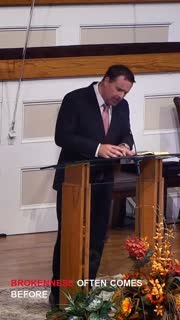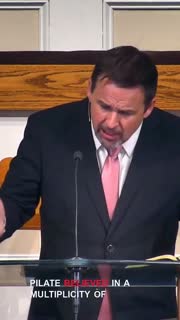From Betrayal to Triumph: Jesus' Journey to the Cross
Devotional
Sermon Summary
Bible Study Guide
Sermon Clips
1. "Jesus' life was not taken from him. Jesus laid his life down. He was willing to give it. But how were the Jewish and the Roman people going to be able to get to the point where they could crucify Jesus Christ? Neither the Jewish nor the Roman governments were perfect. But they had a set of laws that they followed. You weren't allowed to just murder someone that you didn't like. You couldn't just use the government to kill people that you didn't agree with. They had rules." [29:51] (32 seconds)
2. "Brokenness often comes before usefulness. When we are full of ourselves, when we're confident in ourselves and our own ability, then we're useless to God. We're useless to God. It's only when we understand our desperate need of God that we can become useful to him. We often wanna be used like Peter, don't we? We often wanna be the ones that stand on the day of Pentecost and preach and see 3,000 people get saved. How awesome must that have been?" [46:47] (28 seconds)
3. "We often wanna be the one that walks by that man that was crippled and say, silver and gold have I none, but in the name of Jesus Christ, stand up and walk. And the man stands up jumping and leaping for joy. We want to be used like Jesus Christ. Or like Peter, but we don't wanna be broken like Peter was broken. We don't wanna go through those hard times, those difficult times that bring us to the point where we know we are in desperate need of God's help." [47:27] (30 seconds)
4. "Our God is a God who can overcome all deception. Our God is a God who can overcome all denial. Our God is a God who can overcome all defeat. He wins, despite how bleak things may look right now. Our responsibility and our job, is to make sure that we're living in a way that brings glory and honor to God. That we don't use deception in our lives." [56:13] (27 seconds)
5. "We must not deny, and we must not accept defeat. Yes, things can look bleak. Yes, it could seem that everyone else is against us. Yes, it could seem that trials come our way, and it seems everyone's going against. Yes, it seems like our country is changing for a radical way that many people are not pleased with. And yes, it can seem that defeat is on the way, but our God wins. He overcomes death. He overcomes the grave. He overcomes hell. He overcomes all the devices of man. He's a God who wins." [57:34] (30 seconds)
6. "It's amazing how fast things can change in our life. It's amazing how you can go from a great, bold Christian to a cowering denier in just a couple of hours. I feel bad for Peter here, but you know, God was preparing Peter. God was working in his life. Peter was not at the point where he was emotionally or spiritually ready to be where God needed him to be yet. He needed to be broken and it seems that Peter needed this experience of brokenness in order to become useful to God." [46:07] (30 seconds)
7. "The Jewish high priest were using deception to get rid of Jesus Christ. That was the only way they could do it. There was no legitimate way to get rid of him. And so they did. They found people and they deceived others to get rid of Jesus Christ. A second character that we find in this passage and act that we find is the act of denial by Peter." [39:25] (21 seconds)
8. "Pilate believed in a multiplicity of gods and he believed in the philosophy over everything. He didn't believe in a creator God or the creator God's laws. And so therefore, when Jesus shared truth with him and who he was, Pilate had a hard time grasping it. It says in verse 37, Pilate therefore said unto him, art thou a king then? And Jesus answered, thou sayest that I'm a king. To this end was I born and for this cause came I into the world that I should bear witness unto the truth. Everyone that is of the truth hears my voice." [51:44] (33 seconds)
9. "Pilate knew what was being done to Jesus. But he didn't stop it. He tried. He had the power to. He tried to get away with it. He tried to make it as easy as possible. But when it came down to it, he didn't stop it. He told the Jewish religious leaders to deal with it on their own. He tried to put Jesus up against a murderer like Barabbas to have him released. He tried to mock Jesus and then release him. He tried to beat Jesus and then release him. He knew that killing Jesus Christ would be the wrong thing to do. But what is truth?" [53:09] (35 seconds)
10. "The only thing necessary for evil to triumph is for good men to do nothing. When you are driven by lust and power like the religious leaders, and you're not led by a moral conscience, you're not led by a moral conscience, you're not compass of absolute truth like Pontius Pilate, it leads to innocent people being treated unfairly and even killed." [54:41] (21 seconds)
Ask a question about this sermon
2. "Brokenness often comes before usefulness. When we are full of ourselves, when we're confident in ourselves and our own ability, then we're useless to God. We're useless to God. It's only when we understand our desperate need of God that we can become useful to him. We often wanna be used like Peter, don't we? We often wanna be the ones that stand on the day of Pentecost and preach and see 3,000 people get saved. How awesome must that have been?" [46:47] (28 seconds)
3. "We often wanna be the one that walks by that man that was crippled and say, silver and gold have I none, but in the name of Jesus Christ, stand up and walk. And the man stands up jumping and leaping for joy. We want to be used like Jesus Christ. Or like Peter, but we don't wanna be broken like Peter was broken. We don't wanna go through those hard times, those difficult times that bring us to the point where we know we are in desperate need of God's help." [47:27] (30 seconds)
4. "Our God is a God who can overcome all deception. Our God is a God who can overcome all denial. Our God is a God who can overcome all defeat. He wins, despite how bleak things may look right now. Our responsibility and our job, is to make sure that we're living in a way that brings glory and honor to God. That we don't use deception in our lives." [56:13] (27 seconds)
5. "We must not deny, and we must not accept defeat. Yes, things can look bleak. Yes, it could seem that everyone else is against us. Yes, it could seem that trials come our way, and it seems everyone's going against. Yes, it seems like our country is changing for a radical way that many people are not pleased with. And yes, it can seem that defeat is on the way, but our God wins. He overcomes death. He overcomes the grave. He overcomes hell. He overcomes all the devices of man. He's a God who wins." [57:34] (30 seconds)
6. "It's amazing how fast things can change in our life. It's amazing how you can go from a great, bold Christian to a cowering denier in just a couple of hours. I feel bad for Peter here, but you know, God was preparing Peter. God was working in his life. Peter was not at the point where he was emotionally or spiritually ready to be where God needed him to be yet. He needed to be broken and it seems that Peter needed this experience of brokenness in order to become useful to God." [46:07] (30 seconds)
7. "The Jewish high priest were using deception to get rid of Jesus Christ. That was the only way they could do it. There was no legitimate way to get rid of him. And so they did. They found people and they deceived others to get rid of Jesus Christ. A second character that we find in this passage and act that we find is the act of denial by Peter." [39:25] (21 seconds)
8. "Pilate believed in a multiplicity of gods and he believed in the philosophy over everything. He didn't believe in a creator God or the creator God's laws. And so therefore, when Jesus shared truth with him and who he was, Pilate had a hard time grasping it. It says in verse 37, Pilate therefore said unto him, art thou a king then? And Jesus answered, thou sayest that I'm a king. To this end was I born and for this cause came I into the world that I should bear witness unto the truth. Everyone that is of the truth hears my voice." [51:44] (33 seconds)
9. "Pilate knew what was being done to Jesus. But he didn't stop it. He tried. He had the power to. He tried to get away with it. He tried to make it as easy as possible. But when it came down to it, he didn't stop it. He told the Jewish religious leaders to deal with it on their own. He tried to put Jesus up against a murderer like Barabbas to have him released. He tried to mock Jesus and then release him. He tried to beat Jesus and then release him. He knew that killing Jesus Christ would be the wrong thing to do. But what is truth?" [53:09] (35 seconds)
10. "The only thing necessary for evil to triumph is for good men to do nothing. When you are driven by lust and power like the religious leaders, and you're not led by a moral conscience, you're not led by a moral conscience, you're not compass of absolute truth like Pontius Pilate, it leads to innocent people being treated unfairly and even killed." [54:41] (21 seconds)










